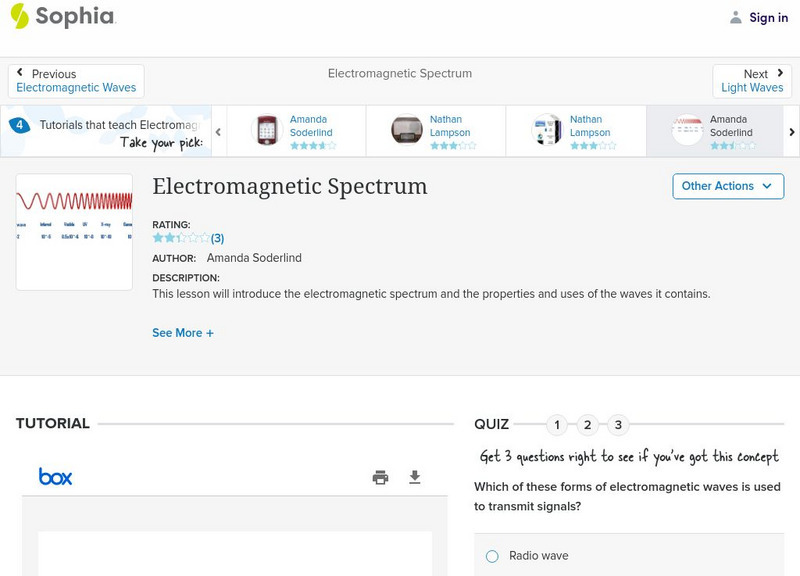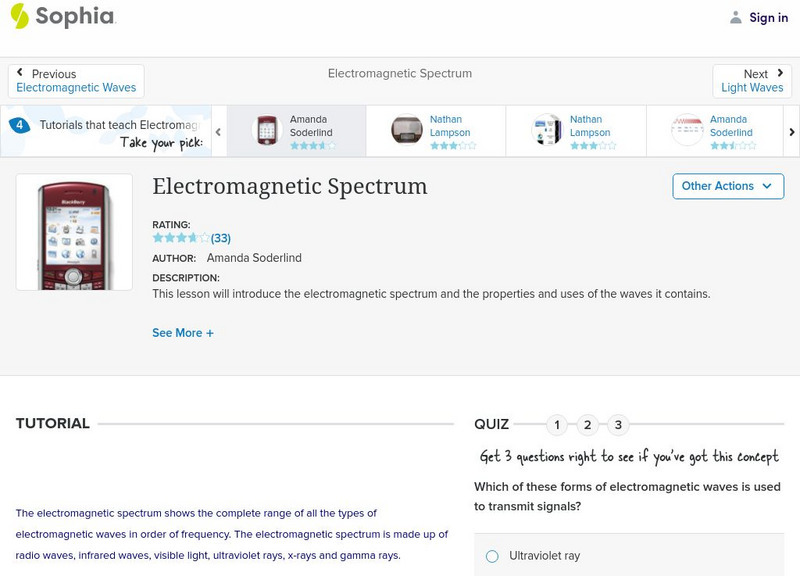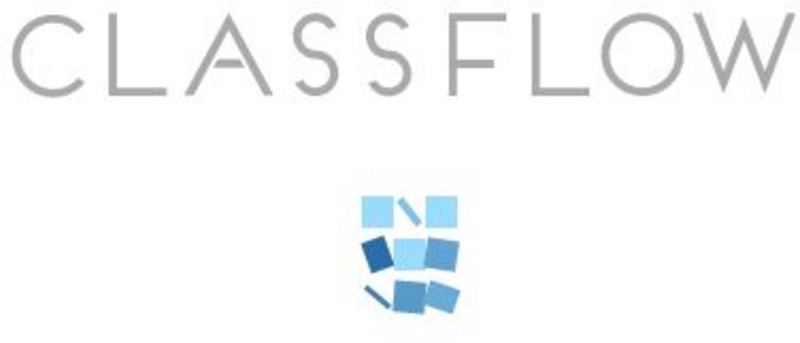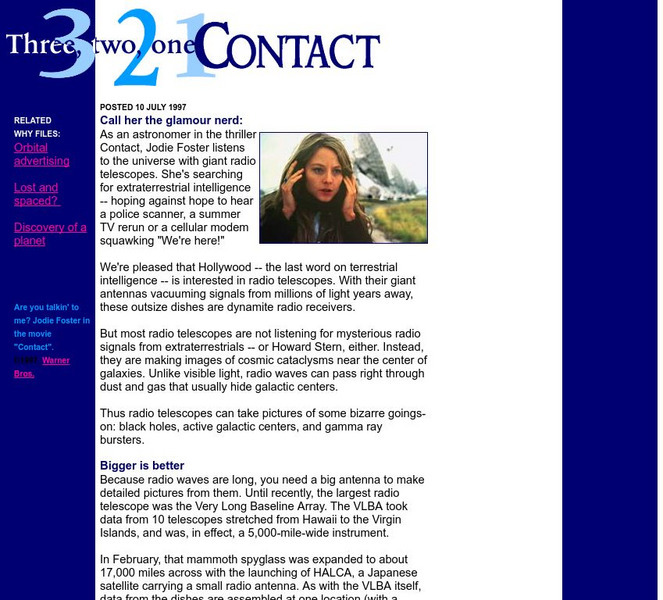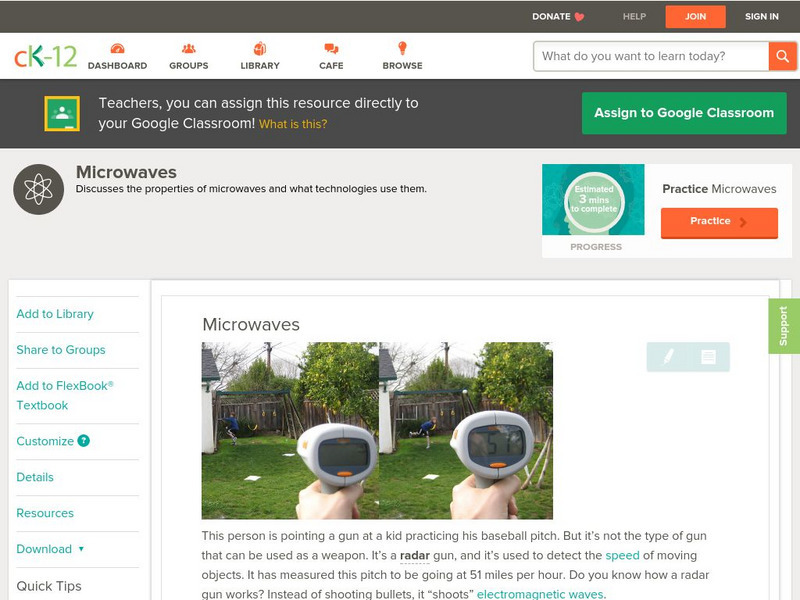University of Colorado
University of Colorado: Physics 2000: Cat Scans: Projecting Shadows
This page and the three pages which follow discuss how X-ray technology can be used to produce an image of the human body. Discussion is understandable and highly intriguing. Several interactive animations allow the visitor to explore...
TeachEngineering
Teach Engineering: Waves: The Three Color Mystery
Students are presented with a challenge question concerning color blindness and asked to use engineering principles to design devices to help people who are color blind. Using the legacy cycle as a model, this unit is comprised of five...
NOAA
Noaa: Space Environment Topics: Radio Wave Propagation [Pdf]
NOAA has produced a series of topic papers for use by teachers and students. This paper is on the increase of radio wave activity and the effects solar emissions have on it. PDF format.
ClassFlow
Class Flow: The Electromagnetic Spectrum
[Free Registration/Login Required] Students will learn the different components of the Electromagnetic Spectrum. They will learn why these different waves are useful in our every day life. They will also learn the difference between a...
NASA
Electromagnetic Spectrum: Ultraviolet Waves
Ultraviolet (UV) light has shorter wavelengths than visible light. Though these waves are invisible to the human eye, some insects can see them. The specific wavelength values are given. Uses and applications of these waves are explained.
University of Colorado
University of Colorado: Physics 2000: Speed of Light
Using an interesting and intriguing format, this page discusses the question of "How does one measure the speed of light." Explanation focuses on Galileo's and Roemer's efforts to obtain a reasonable value. Also discusses Heinrich...
NASA
Nasa: Electromagnetic Spectrum: Radio Waves
Radio waves have the longest wavelengths in the electromagnetic spectrum. This NASA article discusses AM, FM, TV, cell phone, as well as radio astronomy, which all use this technology.
Space Telescope Science Institute
Amazing Space: Star Light Star Bright: Electromagnetic Radiation
Use this tool to learn facts about the range of the electromagnetic spectrum, from radio waves to gamma rays.
Sophia Learning
Sophia: Electromagnetic Spectrum: Lesson 2
This lesson will introduce the electromagnetic spectrum and the properties and uses of the waves it contains. It is 2 of 4 in the series titled "Electromagnetic Spectrum."
Sophia Learning
Sophia: Electromagnetic Spectrum: Lesson 3
This lesson will introduce the electromagnetic spectrum and the properties and uses of the waves it contains. It is 3 of 4 in the series titled "Electromagnetic Spectrum."
Sophia Learning
Sophia: Electromagnetic Spectrum: Lesson 4
This lesson will introduce the electromagnetic spectrum and the properties and uses of the waves it contains. It is 4 of 4 in the series titled "Electromagnetic Spectrum."
Sophia Learning
Sophia: Electromagnetic Spectrum: Lesson 1
This lesson will introduce the electromagnetic spectrum and the properties and uses of the waves it contains. It is 1 of 4 in the series titled "Electromagnetic Spectrum."
TeachEngineering
Teach Engineering: The Three Color Mystery
Students are introduced to an engineering challenge in which they are given a job assignment to separate three types of apples. However, they are unable to see the color differences between the apples, and as a result, they must think as...
TeachEngineering
Teach Engineering: Waves Go Public!
Students apply everything they have learned over the course of the associated lessons about waves, light properties, the electromagnetic spectrum, and the structure of the eye, by designing devices that can aid color blind people in...
University of Colorado
University of Colorado: Physics 2000: X Rays
Here's a really simple demonstration of a fluoroscope. There are links to more information about the uses of X-rays as well.
ClassFlow
Class Flow: Electromagnetic Spectrum
[Free Registration/Login Required] In this Flipchart, students are introduced to the electromagnetic spectrum. Students will learn the names of the types of waves, and the order in which they are arranged. Additionally, students will...
TeachEngineering
Teach Engineering: Sound and Light
The Sound and Light unit provides students with an understanding of sound and light waves through the theme of the "Sunken Treasure," a continuous story line throughout the lessons. In Lessons 1-5, students learn about sound, and in...
TeachEngineering
Teach Engineering: Light It Up
Through an introduction to the design of lighting systems and the electromagnetic spectrum, students learn about the concept of daylighting as well as two types of light bulbs (lamps) often used in energy-efficient lighting design....
University of Wisconsin
The Why Files: 3 2 1 Contact, Don't Touch That Dial
A discussion of reflecting telescopes and their use in radio astronomy. The types of information gained from and the research emphasis fueled by such telescopes is described. Site uses Hollywood references and a humorous style.
CK-12 Foundation
Ck 12: Physical Science: Microwaves
[Free Registration/Login may be required to access all resource tools.] Microwaves and their uses, and how cell phones and radar work.
CK-12 Foundation
Ck 12: Physical Science: Gamma Rays
[Free Registration/Login may be required to access all resource tools.] Explores what gamma rays are and their sources, and the dangers and uses of gamma rays.
CK-12 Foundation
Ck 12: Physics Simulation: Least Time
[Free Registration/Login Required] Explore how Snell's Law arises out of the principle of least time; understand how light rays change direction at interfaces between materials using this interactive simulation. A PDF worksheet and a...




